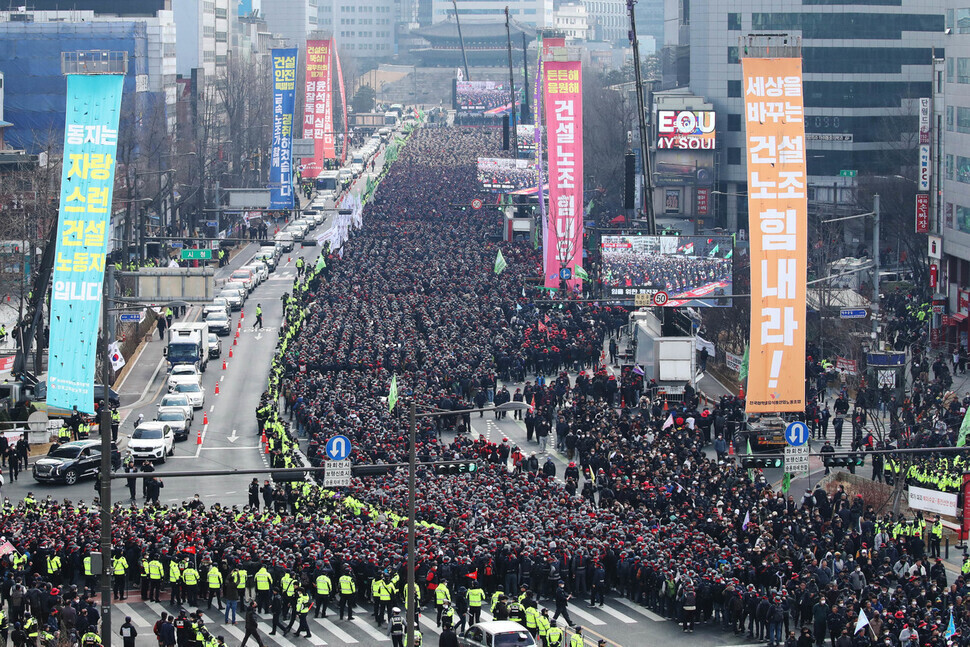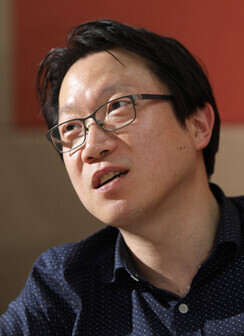hankyoreh
Links to other country sites 다른 나라 사이트 링크
[Column] The malice masked by a year of Yoon Suk-yeol’s incompetence


By Shin Jin-wook, professor of sociology at Chung-Ang University
In the year since the Yoon Suk-yeol administration took office, positive ratings of the president’s job performance have generally hovered in the range of just over 30%.
In the presidential election, the then-candidate Yoon came to power with the support of 32% of all voters. Yet since becoming president, he has not spent a moment working to become a leader for the public and the Republic of Korea in general. Instead, he has remained a leader solely for the supporters who pulled the lever for him.
The biggest factors cited by the 60%–70% of the public who have negatively rated the Yoon administration have been the president’s incompetence and lack of qualifications and his one-sided, dogmatic approach to governance. In other words, most South Koreans are concerned about the fact that he is ignoring their opinions when making important state decisions, all while lacking the capabilities to run an administration, let alone a country.
Over the past year, numerous urgent social issues have been left adrift without being treated as part of the central administration agenda, including things like class disparities in South Korean society, the climate crisis, and the aging population trend.
Given that the Yoon administration has shared no vision or road map in these areas, there doesn’t seem to be much possibility of any real improvements in the next four years. A great many issues that our society urgently needs to respond to have effectively been put on “pause,” like some kind of historical freeze-frame.
But if we succumb to the misunderstanding that the reason the Yoon administration does nothing is because its members of incompetent and irresponsible, we might end up missing an important point: There are a lot of things happening behind that veil of incompetence that will have momentous consequences for South Korean society in the future.
To begin with, serious distortions and regressions in South Korea’s democratic society are proceeding quite quickly. Power has been heavily concentrated with the president and a select few associates, while a bureaucratic system that uses the prosecutors and other unelected state organizations as key means of control is becoming increasingly entrenched.
Without the rule of law, democracy turns into a tyranny of the majority — but without democracy, the rule of law leaves us with authoritarian systems where the law is used as a weapon. Without either democracy or the rule of law, the result is something closer to arbitrary totalitarian rule, where state authority can be wielded however those in power see fit.
The historical lesson that Park Geun-hye’s impeachment left on South Korean society was that even a leader democratically elected through an election and political competition may be forced out of power if they violate constitutional values and the rule of law.
But now the Yoon Suk-yeol administration is imparting a different sort of lesson. At this moment, we are experiencing rule by judicial authorities who are subject to no democratic controls. We face an extremely dangerous concentration of authority, with overlapping abuses of both elected and non-elected power.
Second, the power structures of South Korean capitalism are undergoing changes.
Yoon has expressed his belief that “the market will carry on even when the state disappears.” He has things wrong here. The modern market system could not have emerged or grown without the modern state.
Moreover, the state is the only organization with the power to prevent capitalism from eating people alive. Yet the Yoon administration dreams of corporation activities that are free and utterly unrestrained.
The main target of attacks to achieve this goal has been labor unions. The Yoon administration, the conservative media, and business groups have been tenaciously laying into the organizational base for workers.
In the neoliberal political approaches of Ronald Reagan and Margaret Thatcher, attacking unions was the first step in implementing broader structural reforms to benefit business. The organizing of workers has been the biggest obstacle to ensuring lopsided benefits for companies.
The main tactic adopted by the Yoon administration to weaken worker solidarity has been the “divide and conquer” strategy. This involves putting the different parties at each other’s throats: large corporations and small businesses, regular and irregular workers, union members and non-union members.
Under this discourse and strategy, the power resources available to workers have been weakened through various means. The result is a deepening structural imbalance in power relations between the wealthy and the rest.
The third change — and the one that has been moving the fastest of late — has to do with foreign relations.
During the past month or so, the Yoon administration has been very proactive in terms of South Korea’s relationships with Japan and the US. The key focus here has been on reinforcing a “neo–Cold War” framework pitting South Korea, the US, and Japan on one side against North Korea, China, and Russia on the other.
In the process, South Korea has swiftly found itself enlisted as a subordinate partner to the US-Japan alliance — and ultimately a dependent partner complying with Washington’s global strategy concept.
As geopolitical instability grows in East Asia and the North Korean nuclear threat becomes ever more real, we currently face a serious challenge in preserving peace on the peninsula and ensuring that the neo-Cold War antagonisms do not flare up in our region.
For us to respond effectively to this situation, it is crucially important that we have a well-thought-out strategy and national consensus. Instead of that, we have terribly dangerous changes happening all of a sudden due to the president’s rash and dogmatic actions.
But the ultimate problem that South Korean society is poised to run into is the fact that with all these serious issues confronting the Yoon Suk-yeol administration, there is no sign of any alternative political ideas for overcoming these practical concerns — or of any sort of credible leadership.
Even with all the consistently negative public opinion of the Yoon administration, there is an extensive segment of the voting public that trusts neither the ruling party nor the opposition. We see a sort of deadlock, where most South Koreans are very unhappy about their political reality but unable to actively express their opposition.
Among the younger generations in particular, this reserved attitude has continued ever since the later stages of the Moon Jae-in administration.
In the 2022 presidential election, more 20- and 30-something voters backed the conservative candidate. But since Yoon took office, presidential approving ratings in these age groups have been extremely low — in the 10% to 25% range.
The political affiliation that has increased in the meantime is not support for the Democratic Party or Justice Party. Instead, it has been the proportion of independents.
The findings from a Gallup Korea survey conducted between March 25–27 showed no fewer than 48% of respondents in their 20s saying they did not support any political party; among those in their 30s, the rate was 35%. These are similar percentages to the number of voters who said they saw no “presidential timber” during the election.
Economically, the Moon administration espoused equality, fairness, and justice. But it ended up committing some grave errors in the form of skyrocketing real estate prices and worsening wealth disparities.
Diplomatically, it sought peace, autonomy, and global leadership. But it failed to respond effectively to changes in the international situation following the North Korea-US summit collapse in Hanoi.
It will be difficult to see a new breakthrough in politics if the Democratic Party does not reflect on these errors and change and continues to condemn the Yoon administration for capitalizing on their faults.
After the impeachment of Park Geun-hye, conservative parties remained unchanged and engaged in the politics of blame against the Moon administration. If the Democratic Party follows the same path, the public will not be able to trust and support the party.
A turning point must be established, one that will reaffirm the expectations that the public had of the Moon administration and the Democratic Party, while making sure that the party reflects on its past mistakes and limitations so as to open a new page in history.
In 2016-17, many South Koreans were filled with great hope and pride after the nationwide candlelight rallies and impeachment, as well as the progress in peace discussions at the 2018 inter-Korean summit.
However, that hope is nowhere to be seen now: Disappointment and conflict are abundant, and a widespread sense of hopelessness prevails.
But social change, like the waves of the ocean, ebbs and flows between reform and reaction, dynamism and stagnation. When the positive energy of a society rises, triumphalism spreads, but when it falls, self-depreciation and pessimism abound.
The challenge is to move beyond resistance and criticism. Finding and building on the drive to do so will be an important task for our society in the remaining four years of Yoon’s term.
Please direct questions or comments to [english@hani.co.kr]

Editorial・opinion
![[Editorial] Penalties for airing allegations against Korea’s first lady endanger free press [Editorial] Penalties for airing allegations against Korea’s first lady endanger free press](https://flexible.img.hani.co.kr/flexible/normal/500/300/imgdb/original/2024/0502/1817146398095106.jpg) [Editorial] Penalties for airing allegations against Korea’s first lady endanger free press
[Editorial] Penalties for airing allegations against Korea’s first lady endanger free press![[Editorial] Yoon must halt procurement of SM-3 interceptor missiles [Editorial] Yoon must halt procurement of SM-3 interceptor missiles](https://flexible.img.hani.co.kr/flexible/normal/500/300/imgdb/child/2024/0501/17145495551605_1717145495195344.jpg) [Editorial] Yoon must halt procurement of SM-3 interceptor missiles
[Editorial] Yoon must halt procurement of SM-3 interceptor missiles- [Guest essay] Maybe Korea’s rapid population decline is an opportunity, not a crisis
- [Column] Can Yoon steer diplomacy with Russia, China back on track?
- [Column] Season 2 of special prosecutor probe may be coming to Korea soon
- [Column] Park Geun-hye déjà vu in Yoon Suk-yeol
- [Editorial] New weight of N. Korea’s nuclear threats makes dialogue all the more urgent
- [Guest essay] The real reason Korea’s new right wants to dub Rhee a founding father
- [Column] ‘Choson’: Is it time we start referring to N. Korea in its own terms?
- [Editorial] Japan’s rewriting of history with Korea has gone too far
Most viewed articles
- 160% of young Koreans see no need to have kids after marriage
- 2Presidential office warns of veto in response to opposition passing special counsel probe act
- 3Japan says it’s not pressuring Naver to sell Line, but Korean insiders say otherwise
- 4Months and months of overdue wages are pushing migrant workers in Korea into debt
- 5[Reporter’s notebook] In Min’s world, she’s the artist — and NewJeans is her art
- 6[Editorial] Penalties for airing allegations against Korea’s first lady endanger free press
- 7OECD upgrades Korea’s growth forecast from 2.2% to 2.6%
- 8At heart of West’s handwringing over Chinese ‘overcapacity,’ a battle to lead key future industries
- 9Hybe-Ador dispute shines light on pervasive issues behind K-pop’s tidy facade
- 10Inside the law for a special counsel probe over a Korean Marine’s death